SLOVIANSK, Ukraine — There are fewer signs that this city in Ukraine’s Donbas, seized three years ago by Russian-led forces and then liberated three months later by the Ukrainian army, has been through a war.
Sloviansk, located some 530 kilometers southeast of Kyiv, now boasts brand new businesses — including fancy coffee shops and barbershops. In fact, while initially bringing devastation and ruin, the war has, strangely, become an impetus for the development of this city of 113,000 people.
One of the city’s new businesses, Prosto Kava, a popular coffee shop, is located not far from the city administration building, which served as the headquarters of Igor Girkin, the former Russian military intelligence officer who commanded the Russian-led forces that occupied the city between April and July 2014.
Unlike most cafes in the city, Prosto Kava resembles some of the trendiest spots in Kyiv: It has two rooms with a modern loft-style design, one of which has a huge bar where various types of coffee drinks are served, and another one with beanbags, board games and a projector screen for watching movies. One wall of the room with the coffee bar is entirely covered with hand-made toys, which are made by the café’s owners and other craftspeople from nearby areas.
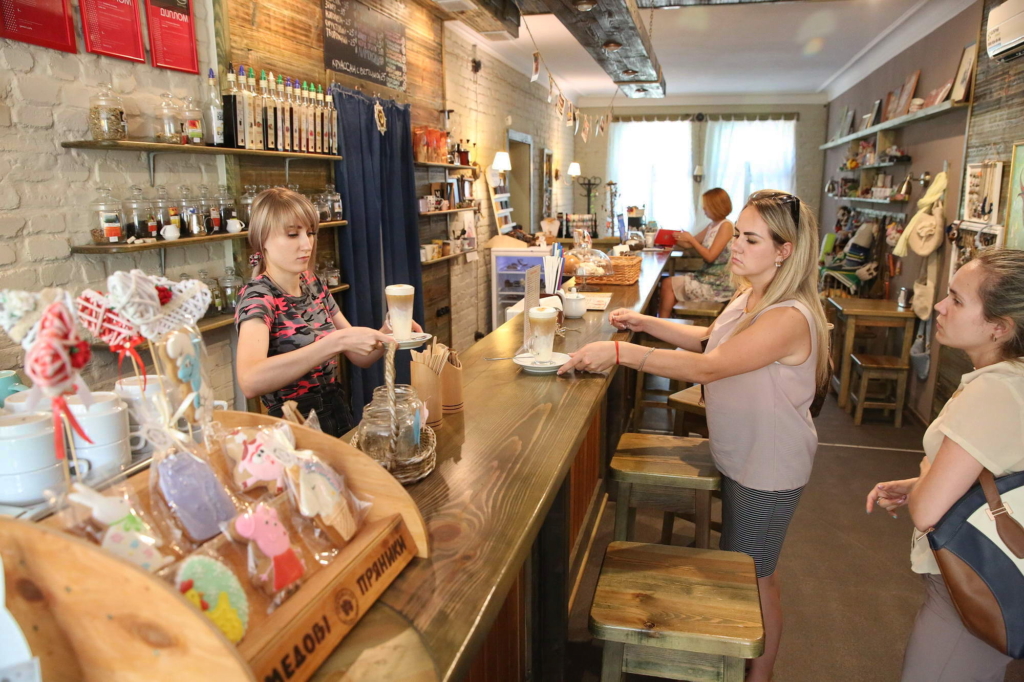
The staff of Prosto Kava cafe in Sloviansk serves visitors the coffee shop on Aug. 16. (Volodymyr Petrov)
“Initially, it wasn’t clear whether people would like this style of a café, or say it’s just nonsense,” café co-owner Julia Goriun told the Kyiv Post. “Variety among cafes appeared only recently — before that, they were all the same.”
Goriun opened Prosto Kava in May 2016 along with another local resident, Julia Cherkasova. Goriun, a native of the Luhansk Oblast city of Sorokyne, which is now occupied by Russian-led forces, settled in Sloviansk in the winter of 2015.
Cherkasova and Goriun worked at the same bank in Sloviansk, but both dreamed of finding a more creative job.
“I always wanted to do something with my hands, but I never had time for it. I used to basically live at work,” Goriun said.
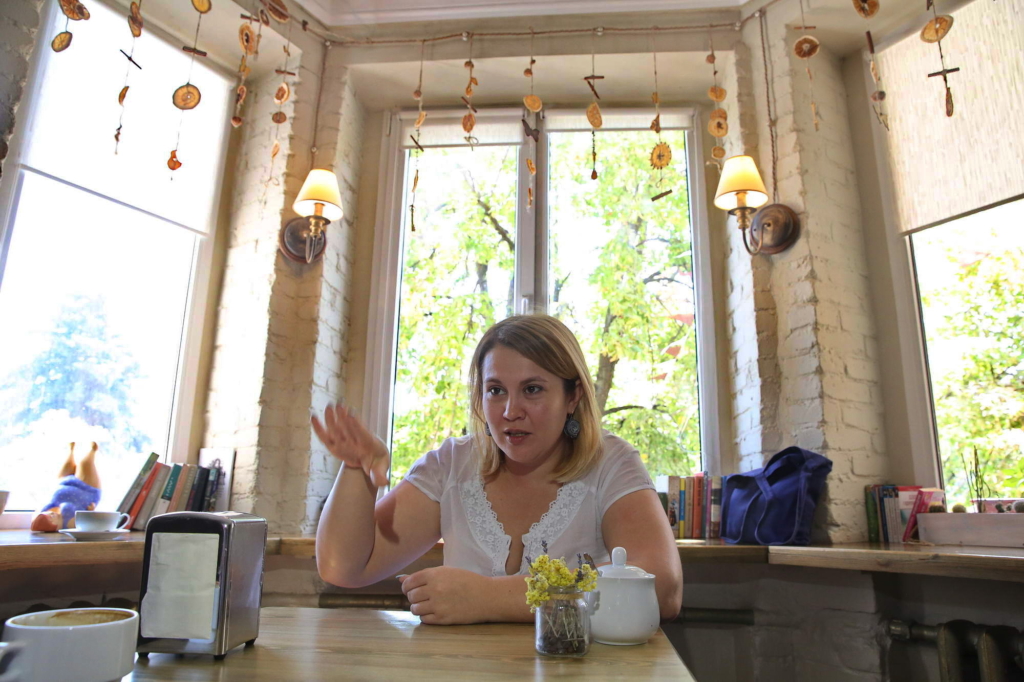
Julia Goriun, a co-owner of Prosto Kava cafe in Sloviansk, speaks to the Kyiv Post journalist on Aug. 16. (Volodymyr Petrov) (Kostyantyn Chernichkin)
So when international donors offered them a grant, Cherkasova and Goriun jumped at the opportunity to open a café.
Overall, however, the rebuilding needs of the Donbas are vast. Some government estimates put the cost at $50 billion, including those areas still occupied by Russia. The money spent so far, from public and private sources, is estimated at $4.5 billion, according to the Ukrainian government.
Business grants
After the fighting in the area stopped, Sloviansk received funding from various international organizations, helping people not only rebuild their houses, but also giving entrepreneurs in the region the chance to start new businesses.
Sloviansk is just 30 kilometers from Kramatorsk, which is now the administrative center of the part of Donetsk Oblast that is still under the control of the Ukrainian government. Over 20,000 people from separatist-controlled areas who were forced out of their homes in Russian-occupied areas have relocated to Kramatorsk.
The influx of internally displaced persons, local government workers (who moved from Russian-occupied Donetsk) and staff of international organizations has caused a mini boom in the local economy.
Goriun and Cherkasova won two grants worth a total of Hr 340,000 ($12,800) from the United Nations Development Program in Ukraine, which they used to open their coffee shop.
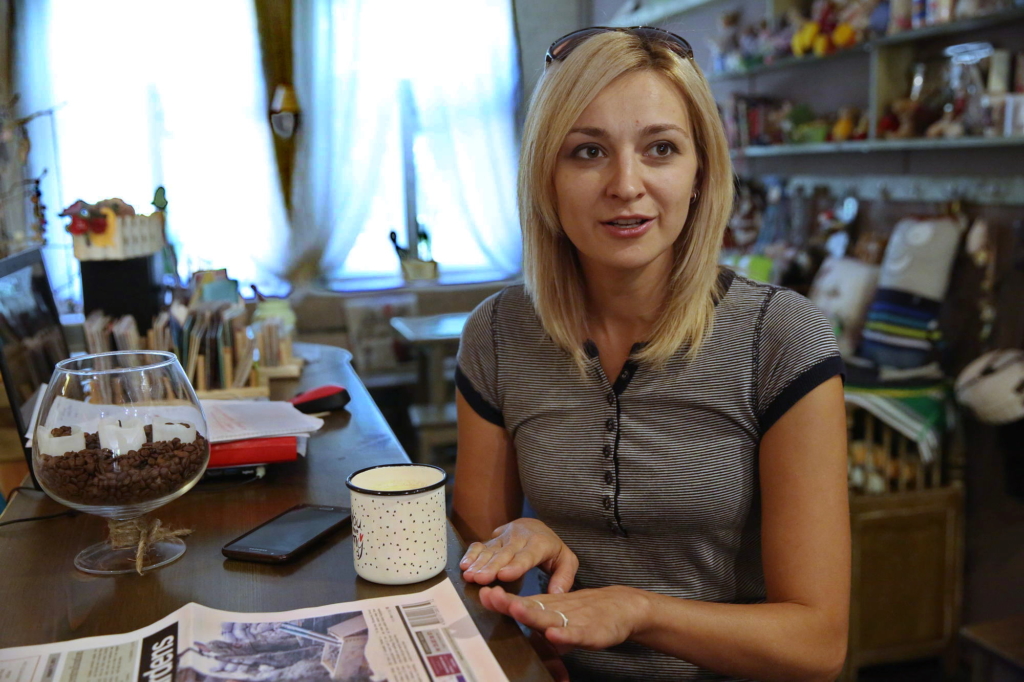
Julia Cherkasova, a co-owner of Prosto Kava cafe in Sloviansk, speaks to the Kyiv Post journalist on Aug. 16. (Volodymyr Petrov) (Kostyantyn Chernichkin)
“We were traveling across Ukraine and saw various cute shops and cafes. We thought the people of Sloviansk — especially young people — also needed places like that. When I was growing up in Sloviansk there wasn’t much to do here,” Cherkasova said.
In 2016, the UN granted about Hr 40 million ($1.5 million) to more than 270 entrepreneurs from the government-controlled parts of Donetsk and Luhansk oblasts and those who had moved there from the Russian-occupied areas.
Overall, since Russia unleashed its war in Donbas in 2014, Ukrainian government has allocated $3.6 billion from the state budget to rebuild the region, while international governments and foundations have transferred around $890 billion for the purpose, according to Ukrainian Minister for Temporary Occupied Territories Vadym Chernysh.
Goriun said that they planned to open a shop with hand-made toys where visitors could also drink coffee, but switched their focus to coffee after Goriun took some barista courses in Kyiv.
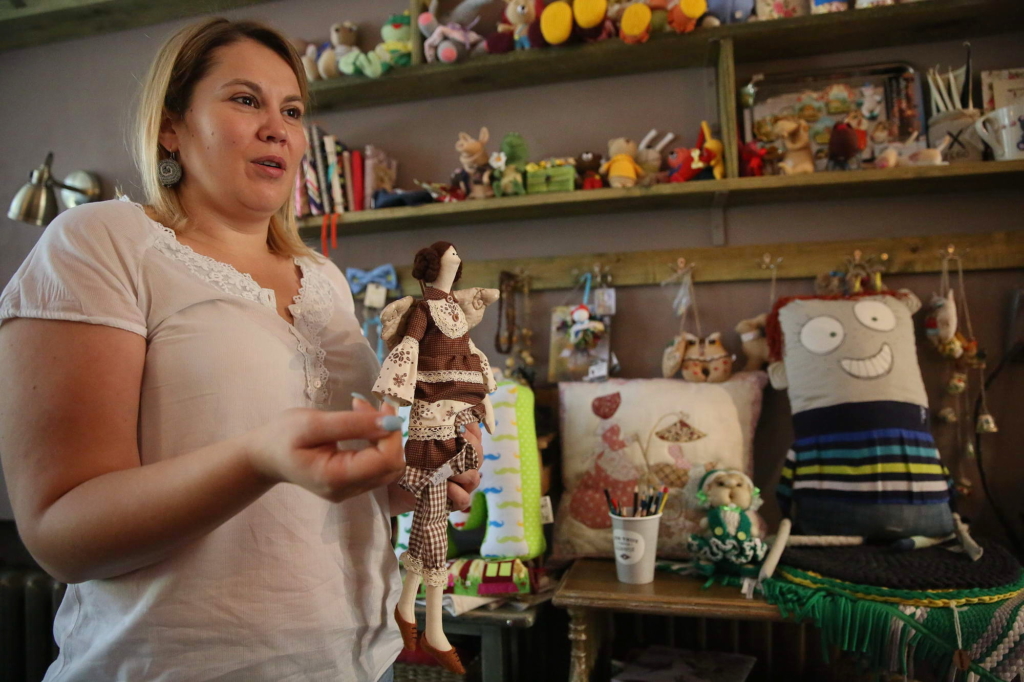
Julia Goriun, a co-owner of Prosto Kava cafe in Sloviansk, shows the toys she has made on Aug. 16. (Volodymyr Petrov)
The owners also wanted to make the second room in Prosto Kava an “anti-café,” where visitors paid only for time spent there, but Goriun said that people in Sloviansk didn’t like the idea. Instead, the second room is used to host handicraft workshops for children, and to screen movies.
This summer, the two also opened an outdoor coffee spot in Shovkovychny Park, not far from the city center.
“Before the war, we didn’t live for ourselves. We just did what we needed to do. After the war, everything changed, and we decided to do what really brings us joy,” Cherkasova said.
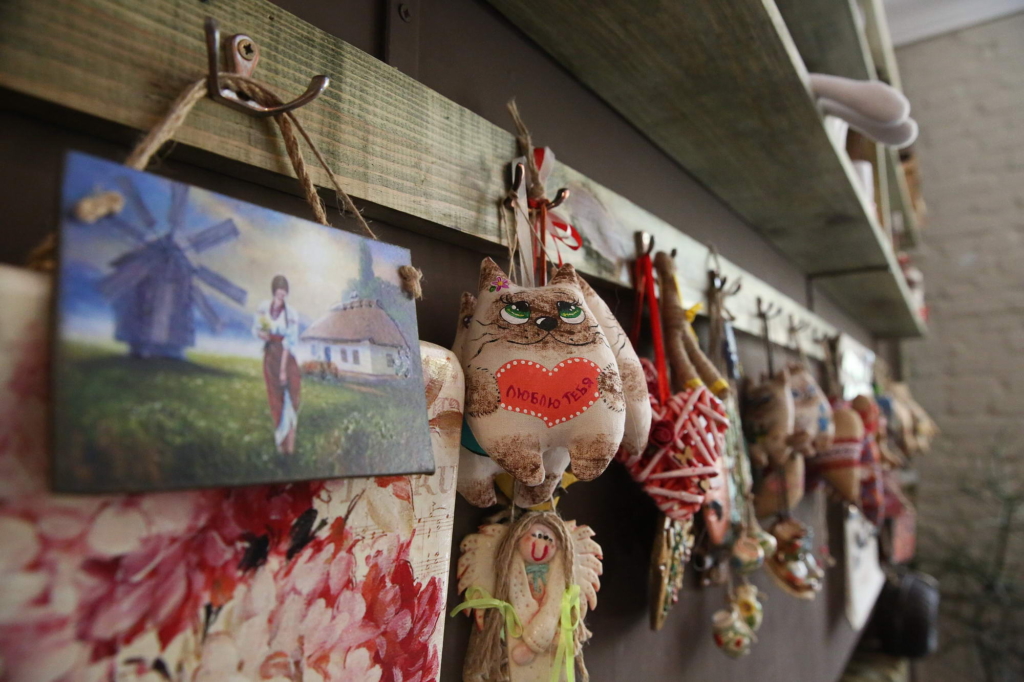
The picture features hand-made toys that are being sold in Prosto Kava cafe in Sloviansk. (Volodymyr Petrov) (Kostyantyn Chernichkin)
Barbershop duo
With new barbershops opening all across Ukraine, and Ivan and Marina Zhurba decided to follow the trend and open one in Sloviansk.
Inspired by barbershops in Lviv, the couple opened their first outlet, called Hardy, in their native city this spring.
“I didn’t have a beard at that time, but my hair stood on end when I first entered a barbershop (in Lviv),” 38-year-old Ivan Zhurba told the Kyiv Post.
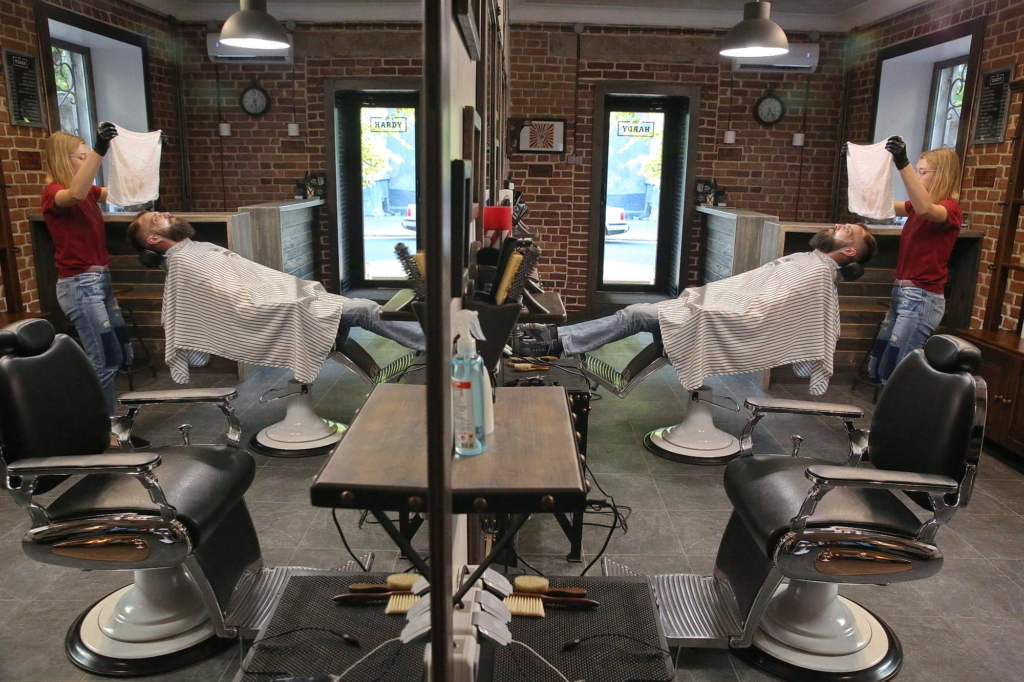
A man has his beard trimmed in Hardy barbershop in Sloviansk on Aug. 17. (Volodymyr Petrov) (Kostyantyn Chernichkin)
After they returned from Lviv in 2015, Marina Zhurba sold her car and rented premises in the city center, next to the closed Palace of Culture, which was damaged during the fighting in 2014. The couple completely refurbished the room, which now has stylish brick walls, leather sofas and an impressive bar with whiskey and other alcoholic beverages.
Zhurbas also hired students from the local college and sent them to study at a barbershop in Kharkiv, Ukraine’s second-biggest city, located about 160 kilometers to the north-west of Sloviansk.
The couple said that many of local residents hadn’t even been to barbershop before, so at first the Zhurbas gave them haircuts for free. Now they usually have around 10 clients per day.
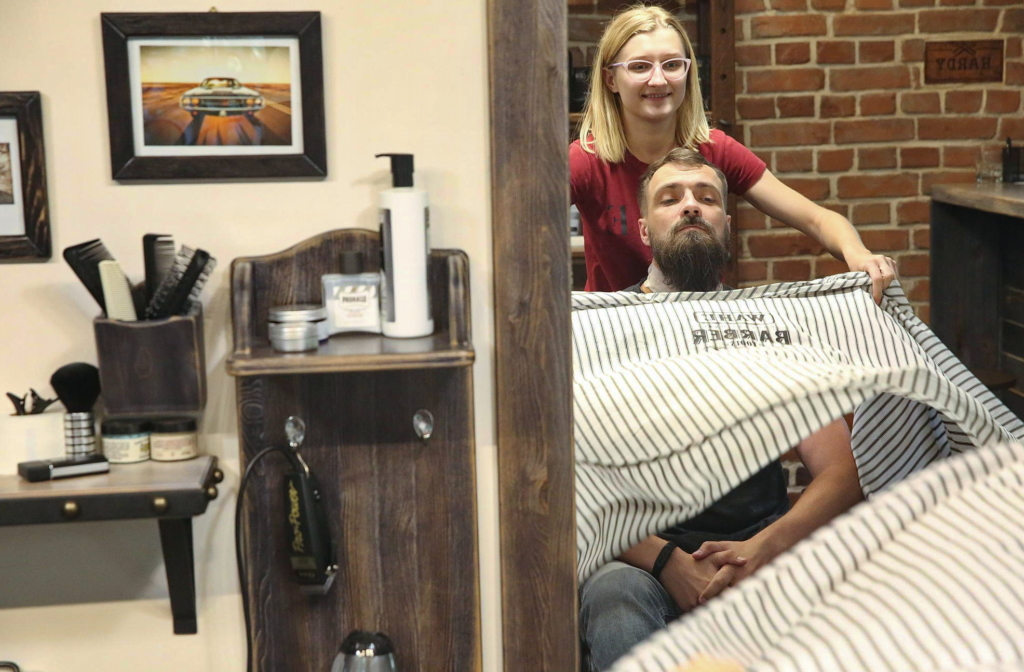
A man has his beard trimmed in Hardy barbershop in Sloviansk on Aug. 17. (Volodymyr Petrov) (Kostyantyn Chernichkin)
Marina said that most of their clients were people who had moved to Sloviansk from other big cities, and who had already been to barbershops before.
“It’s not just a hairdressing salon, but rather a men’s club. People come here for a trim of their beard and mustache and to communicate,” Ivan said, adding that many of their clients drop by for a coffee or a glass of whiskey even when they don’t need a haircut.
Ivan joked that they never run out of drinks, because most of their clients bring a bottle for them as a present.
Despite barbershops being considered to be “a man’s place,” the couple employs female hairdressers too. In fact, most of the hairdressers in Sloviansk are women.
“If a man wanted to become a hairdresser in Sloviansk, he would face various stereotypes. It’s a problem in a provincial city that doesn’t have a barbershop culture,” Marina said.
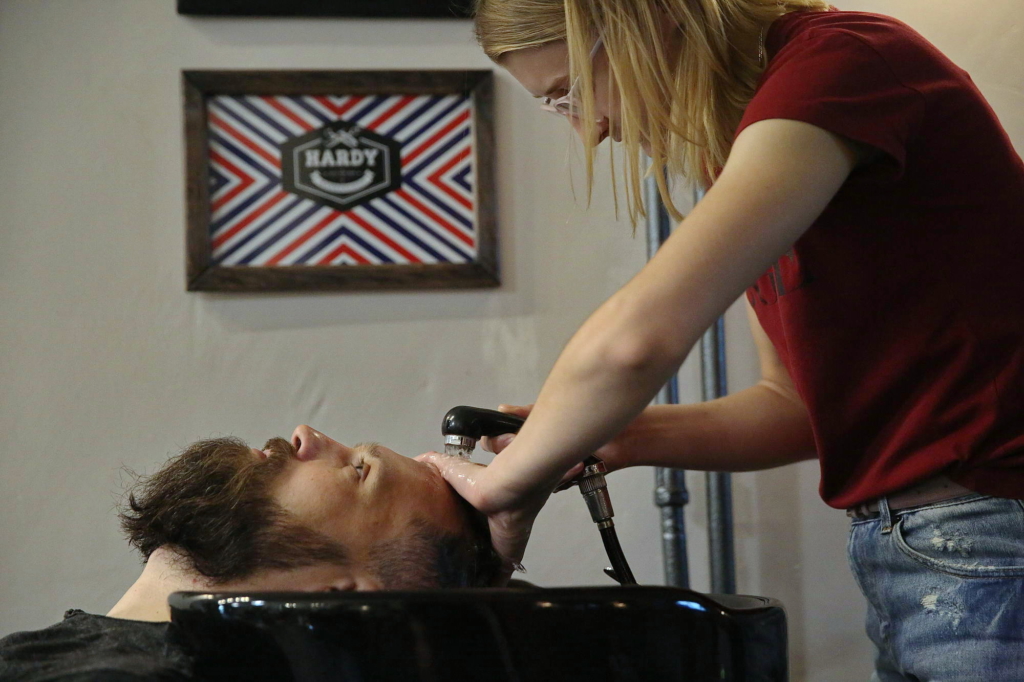
Dmytro Drizhd, 40, has his beard trimmed in Hardy barbershop in Sloviansk on Aug. 17. (Volodymyr Petrov) (Kostyantyn Chernichkin)
The price of a haircut in Hardy is relatively low — Hr 150 or $5. The couple said that the barbershop is still not profitable, because they spent a large amount of money on furniture and equipment. The family is supported by Ivan’s main job at a local waste recycling company.
“Of course, it was easy for us to open, because we didn’t have any competitors,” Ivan said. “But we realized that if we didn’t do our work well, we wouldn’t have any clients.”
“Now I think that if someone wants to open another barber shop in Sloviansk, it’s going to be hard for them to compete with us,” Ivan added, while pouring a glass of whiskey for his client.
